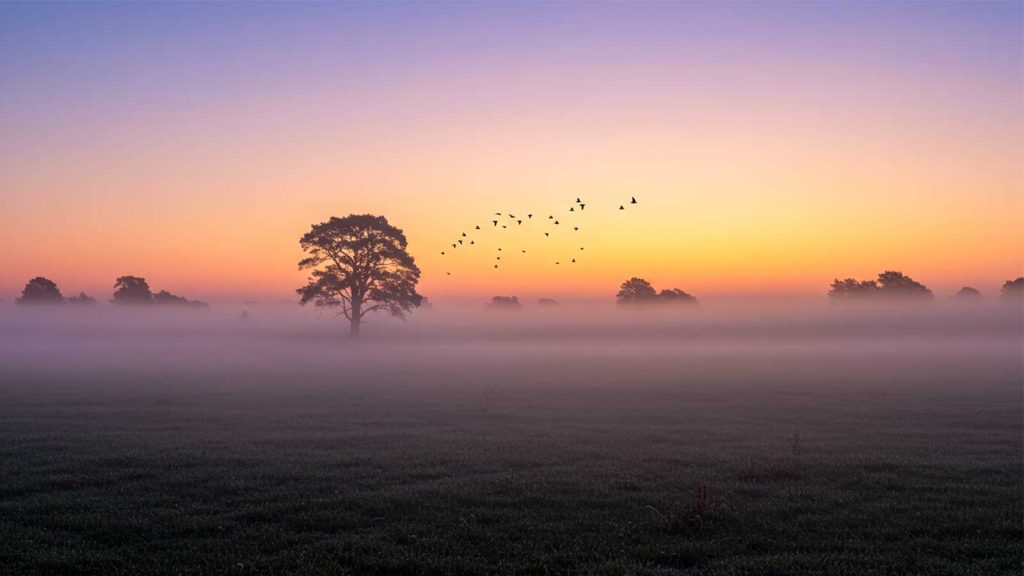The Psalm 19 begins with one of the most beautiful poetic declarations in Scripture, revealing the greatness of God through creation and His Word.
This psalm, attributed to King David, is one of the richest texts in spiritual and theological meaning, and its content remains relevant and inspiring for readers of all generations.
Complete Psalm 19
¹ The heavens declare the glory of God and the firmament shows the work of His hands.
² Day after day pours forth speech, and night after night reveals knowledge.
³ There is no speech or language where their voice is not heard.
⁴ Their line has gone out through all the earth, and their words to the end of the world. In them He has set a tent for the sun,
⁵ which is like a bridegroom coming out of his chamber, and rejoices like a strong man to run its course.
⁶ Its rising is from one end of the heavens, and its course to the other end; and nothing is hidden from its heat.
⁷ The law of the LORD is perfect, reviving the soul; the testimony of the LORD is sure, making wise the simple;
⁸ The precepts of the LORD are right, rejoicing the heart; the commandment of the LORD is pure, enlightening the eyes;
⁹ The fear of the LORD is clean, enduring forever; the judgments of the LORD are true and righteous altogether.
¹⁰ More desirable are they than gold, even than much fine gold; sweeter also than honey and the honeycomb.
¹¹ Moreover, by them is your servant warned; and in keeping them there is great reward.
¹² But who can discern his errors? Cleanse me from hidden faults.
¹³ Keep your servant also from presumptuous sins, so they may not rule over me. Then I shall be blameless, and I shall be innocent of great transgression.
¹⁴ Let the words of my mouth and the meditation of my heart be acceptable in your sight, O LORD, my rock and my redeemer!

Complete Word-for-Word Explanation of Psalm 19
Verse 1
“The heavens declare the glory of God and the firmament shows the work of His hands.”
This verse shows how creation reveals the majesty of God. The heavens and the firmament constantly and visibly witness the divine creative power. Even without words, nature is a living testimony of the existence and glory of God.
Verse 2
“Day after day pours forth speech, and night after night reveals knowledge.”
The message of creation is continuous and unbroken. Each day and night conveys knowledge, wisdom, and beauty, revealing a divinely ordered cycle.
Verse 3
“There is no speech or language where their voice is not heard.”
The communication of nature does not depend on human languages. It is silent, yet universally understood. All people have access to this silent testimony of the divine presence.
Verse 4
“Their line has gone out through all the earth, and their words to the end of the world. In them He has set a tent for the sun,”
The scope of this revelation is total. The “line” represents the reach of creation’s voice, which extends throughout the earth. The sun is introduced as a central element in this scene created by God.
Verse 5
“Which is like a bridegroom coming out of his chamber, and rejoices like a strong man to run its course.”
The sun is compared to a joyful bridegroom and a strong hero, symbolizing its energy, brilliance, and constancy. It fulfills its course with enthusiasm and vigor, reflecting the perfect order established by God.
Verse 6
“Its rising is from one end of the heavens, and its course to the other end; and nothing is hidden from its heat.”
This verse emphasizes the vastness and power of the sun. Nothing can escape its heat, just as no one can escape the presence and influence of the Creator who sustains it.
Verse 7
“The law of the LORD is perfect, reviving the soul; the testimony of the LORD is sure, making wise the simple;”
From this point, the focus of the psalm shifts from creation to the Word of God. The law is described as perfect and refreshing, capable of transforming and renewing the soul. It also offers wisdom even to the simplest.
Verse 8
“The precepts of the LORD are right, rejoicing the heart; the commandment of the LORD is pure, enlightening the eyes;”
Divine principles bring true joy and spiritual clarity. The pure commandment is like light to the eyes, providing discernment and secure direction.
Verse 9
“The fear of the LORD is clean, enduring forever; the judgments of the LORD are true and righteous altogether;”
A reverent fear of the LORD is pure and eternal. His judgments are trustworthy and always right. This highlights the unwavering justice of God.
Verse 10
“More desirable are they than gold, even than much fine gold; sweeter also than honey and the honeycomb.”
The Word of God is compared with the greatest riches and the sweetest flavors. No material thing can surpass the value and pleasure found in following the divine teachings.
Verse 11
“Moreover, by them is your servant warned; and in keeping them there is great reward;”
The commandments not only guide but also correct. Obeying them brings rewards, both spiritual and practical, to the faithful servant’s life.
Verse 12
“But who can discern his errors? Cleanse me from hidden faults;”
David acknowledges that there are sins that we are not always aware of. He pleads for complete purification, including the faults hidden even from his own awareness.
Verse 13
“Keep your servant also from presumptuous sins, so they may not rule over me. Then I shall be blameless, and I shall be innocent of great transgression;”
The psalmist asks for protection against pride, which can dominate the heart and lead to downfall. By being freed from pride, he can live with sincerity and avoid grave sin.
Verse 14
“Let the words of my mouth and the meditation of my heart be acceptable in your sight, O LORD, my rock and my redeemer!”
This final prayer expresses the desire that both the words of one’s mouth and the meditation of one’s heart be pleasing in the sight of God. The psalmist trusts in the LORD as his firm foundation (Rock) and Savior (Redeemer).

The Natural Revelation of God
The Psalm 19 begins by exalting how the heavens and the firmament proclaim the glory of God. Nature, with all its beauty and perfection, is presented as a universal language, understood by all, regardless of culture or language.
The Wordless Language
One of the central messages of Psalm 19 is that the movement and setting of the celestial bodies silently testify to the existence and majesty of the Creator. This wordless “language” echoes day and night, declaring the order, precision, and divine wisdom.
The Sun as an Example of Glory
David uses the sun as a clear example of the divine presence. The sun, with its constant path, warms and illuminates the entire Earth, symbolizing God’s omnipresence and His care for all creation.
The Revelation of the Word of God
In the second part of Psalm 19, the focus turns to the Law of the LORD. Here, the psalmist celebrates the perfection, justice, and purity of the Word of God, in contrast to the natural revelation.
The Law as a Source of Wisdom
The text affirms that the Law of the LORD is perfect and revives the soul. It gives wisdom to the simple, rejoices the heart, and enlightens the eyes. These verses underscore the importance of Scripture for spiritual growth.
The Purity and Justice of the Commandments
The commandments of the LORD are described as pure and righteous, more desirable than gold and sweeter than honey. This comparison expresses the unparalleled value of the divine Word.
The Human Response to Revelation
Psalm 19 concludes with a personal reflection. The psalmist acknowledges his hidden faults and asks God for purification and deliverance from sin.
Acknowledging Human Frailty
David shows humility in acknowledging that he cannot perceive all his mistakes. This demonstrates the need to depend on God to discern and correct wrong paths.
A Heart Aligned with God
The psalm ends with a sincere desire: that the words of the mouth and the meditation of the heart be pleasing to God. It is a prayer for integrity, a cry for a life in accordance with the divine will.
The Poetic Beauty of Psalm 19
The structure of Psalm 19 is a masterpiece of Hebrew poetry. The combination of natural creation and revelation through Scripture creates a complete portrait of divine glory.
Parallelism and Style
The use of parallelism is a striking feature, with ideas repeated in an enriched manner. This structure aids in memorization and a deeper understanding.
Rich and Meaningful Imagery
The images used, such as the sun, gold, and honey, are powerful and accessible, touching both the intellect and the emotions of the reader.
Psalm 19 in Liturgy and Culture
Psalm 19 has been widely used in liturgical contexts, sermons, and sacred music. Its powerful message transcends centuries.
Liturgical Use
In various religious traditions, this psalm is recited or sung as part of worship services and celebrations, emphasizing both creation and the Word of God.
Influence in Art and Music
Artists, composers, and writers have been inspired by Psalm 19 to create works that communicate spirituality and beauty.
Applying Psalm 19 in Daily Life
Psalm 19 offers valuable principles for everyday life. It teaches us to observe nature with reverence and deeply value the Word of God.
Contemplation of Creation
Taking time to observe the natural world can strengthen faith and increase gratitude toward God. The beauty of the world around us is a constant reminder of the divine presence.
Meditation on the Word
Devoting daily moments to reading and reflecting on Scripture can renew the mind and transform the heart. Psalm 19 encourages this practice.
The Spiritual Impact of Psalm 19
Psalm 19 is not just a beautiful poem. It carries a spiritual power that can deeply touch the soul.
Strengthening of Faith
By showing how nature and the Word testify about God, this psalm strengthens confidence in His care and sovereignty.
An Invitation to Holiness
The final part of the psalm is a call to personal holiness, to a sincere commitment to integrity and pure intentions.

FAQ about Psalm 19
What does it mean that “the heavens proclaim the glory of God”?
It means that nature, in its beauty and order, reflects the existence and power of the Creator, even without using words.
What is the main division of Psalm 19?
The psalm is divided into three parts: the revelation of God in nature, in His Word, and the human response to these revelations.
Why is Psalm 19 so valued?
Because of its poetic beauty, spiritual depth, and clarity in presenting the relationship between God, creation, and humanity.
How can Psalm 19 be applied today?
By observing nature with spiritual eyes, valuing and meditating on the Word, and seeking to live with integrity before God.
Does Psalm 19 speak about Jesus?
Although it does not directly mention Jesus, Christians see connections between the revealed Word and Jesus as the Word of God.
Conclusion – Psalm 19
Psalm 19 is a powerful fusion between the grandeur of creation and the perfection of divine revelation. It leads us from contemplating the heavens—silently declaring the glory of God—to the transforming beauty of His Word, which instructs, rejoices, purifies, and guides the human heart.
David invites us to see the world with spiritual eyes, recognizing that nature is a constant proclamation of the Creator. But he goes further, showing that although creation points to God, it is His Word that truly reveals who He is and how we should live.
In the end, the psalmist leads us to introspection, acknowledging our limitations, our hidden sins, and the constant need to depend on the LORD. His prayer for purity, humility, and acceptance before God reveals the heart of someone who wishes to live in full communion with the Father.
Psalm 19 challenges us to live with eyes open to the beauty of creation, with a heart steadfast in the Word of God, and with a life that seeks to please the LORD in everything—in our words, thoughts, and actions. May this also be our daily prayer: that we may be transformed by what we see, read, and meditate upon, for the glory of our LORD, Rock, and Redeemer.
READ ALSO:
- Psalm 17: A Cry for Justice and Divine Protection
- Psalm 16: Discover the Depth of a Prayer
- Psalm 15: What God Expects from the Righteous Man
FOLLOW US ON FACEBOOK
I hope you enjoyed the explanation of Psalm 19